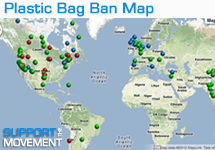Start a Bag Ban in Your Community and Start a Positive Eco-Chain Reaction

Start a Bag Ban in Your Community and Start a Positive Eco-Chain Reaction
The small and simple gesture of banning plastic bags can set off a chain of events that can greatly and positively change lives in your community and beyond. Here are five ways banning plastic bags in your hometown can change life as you know it for the better.
- Stores have to factor all of their expenses into the prices they charge their shoppers – this makes perfect sense and is how businesses cover their bills, pay their staff and turn a profit. When retailers purchase disposable bags for shoppers to carry items home that expense needs to be recouped, and prices reflect this expense. Everyone may only pay a penny or two per item, but that can easily add up over time. No plastic bags mean retailers are not spending additional money so prices should drop. Shoppers can save $18 to $30 at the checkout annually when plastic bags are banned.
- Plastic bag litter can cause major problems, like clogging drainage systems and canals – In Brownsville, Texas a litter-blocked drainage system was unable to function properly after a hurricane passed through and major flooding resulted. The additional damage and cleanup caused undo stress and expense to a town struggling to clean up from the storm, so much so that Brownsville later passed a ban to prevent this problem from happening again. A more extreme example would be in India where plastic bag litter has caused severe flooding during the rainy season that has resulted in human casualties.
- The water-tight qualities that allow plastic bags to block drainage systems also allow discarded bags to collect rainwater and dew and can serve as breeding grounds for mosquitoes – These insects at best are irritating nuisances that can leave itchy, irksome bites, but they can also carry the West Nile and Triple E viruses. These illnesses can be transmitted to humans and people die each year from these viruses. Talk to your local county pest control and you will find an enemy of single-use plastic bags. Only a mere teaspoonful of water easily held in a discarded plastic bag can be enough to foster an unhealthy breeding ground for mosquitoes. Plastic bag litter is not the only material that holds water and allows mosquitoes to breed – old tires, jars, and cans are also culprits. Eliminating litter like single-use plastic bags plays a huge part in eliminating mosquitoes, and is enough of a reason to ban plastic bags. Reducing the possibility of disease and illness further improves the quality of life in your community.
- Plastic bags are not biodegradable, so once they are here, they are here to stay – When single-use bags become litter they pollute rivers, farmland, cities, and neighborhoods. Bans help eliminate litter, so you can enjoy clean streets and sidewalks and when you look out your windows you won’t see stray plastic bags billowing like tumbleweeds. Less plastic bag litter means there is less risk to animals and their habitats which is great for your local ecosystem, but it also lessens the chance of birds and other animals ingesting plastic bags and dying as a result.
- Picking up litter is expensive and taxpayers foot the bill – Banning bags means less litter, so there is less trash to pick up and municipal employees’ time and tax dollars can be directed to other areas where it is sorely needed in your community.
Both Your Community and Fiscal Health Will Benefit
Plastic bag bans are proven to reduce litter which is plenty of incentive to banish these disposable nuisances from your hometown, but less litter translates into so many more perks than just cleaner streets. A plastic bag ban can have enormous impacts that will benefit your community member’s health and fiscal health for the better, forever.
For more information on the stories behind municipalities all over the world that have started successful bag bans, please visit our interactive, worldwide plastic bag ban map.
